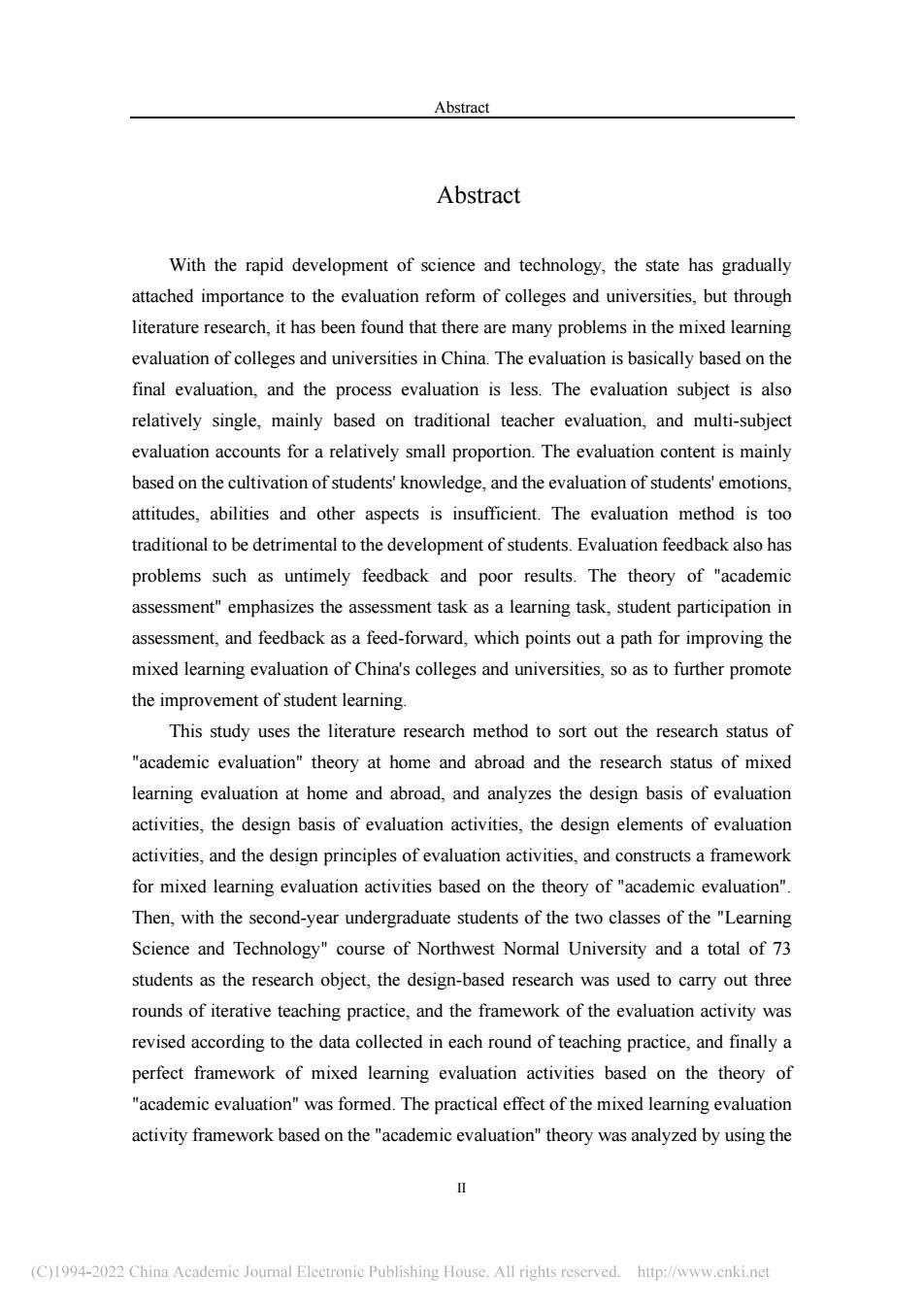
Abstract Abstract With the rapid development of science and technology,the state has gradually attached importance to the evaluation reform of colleges and universities,but through literature research,it has been found that there are many problems in the mixed learning evaluation of colleges and universities in China.The evaluation is basically based on the final evaluation,and the process evaluation is less.The evaluation subject is also relatively single,mainly based on traditional teacher evaluation,and multi-subject evaluation accounts for a relatively small proportion.The evaluation content is mainly based on the cultivation of students knowledge,and the evaluation of students'emotions. attitudes,abilities and other aspects is insufficient.The evaluation method is too traditional to be detrimental to the development of students.Evaluation feedback also has problems such as untimely feedback and poor results.The theory of "academic assessment"emphasizes the assessment task as a learning task,student participation in assessment,and feedback as a feed-forward,which points out a path for improving the mixed learning evaluation of China's colleges and universities,so as to further promote the improvement of student learning. This study uses the literature research method to sort out the research status of "academic evaluation"theory at home and abroad and the research status of mixed learning evaluation at home and abroad,and analyzes the design basis of evaluation activities,the design basis of evaluation activities,the design elements of evaluation activities,and the design principles of evaluation activities,and constructs a framework for mixed learning evaluation activities based on the theory of"academic evaluation" Then,with the second-year undergraduate students of the two classes of the"Learning Science and Technology"course of Northwest Normal University and a total of 73 students as the research object,the design-based research was used to carry out three rounds of iterative teaching practice,and the framework of the evaluation activity was revised according to the data collected in each round of teaching practice,and finally a perfect framework of mixed learning evaluation activities based on the theory of "academic evaluation"was formed.The practical effect of the mixed learning evaluation activity framework based on the"academic evaluation"theory was analyzed by using the C)1994-2022 China Academie Joumal Electronie Publishing House.All rights reserved.http://www.enki.net
Abstract II Abstract With the rapid development of science and technology, the state has gradually attached importance to the evaluation reform of colleges and universities, but through literature research, it has been found that there are many problems in the mixed learning evaluation of colleges and universities in China. The evaluation is basically based on the final evaluation, and the process evaluation is less. The evaluation subject is also relatively single, mainly based on traditional teacher evaluation, and multi-subject evaluation accounts for a relatively small proportion. The evaluation content is mainly based on the cultivation of students' knowledge, and the evaluation of students' emotions, attitudes, abilities and other aspects is insufficient. The evaluation method is too traditional to be detrimental to the development of students. Evaluation feedback also has problems such as untimely feedback and poor results. The theory of "academic assessment" emphasizes the assessment task as a learning task, student participation in assessment, and feedback as a feed-forward, which points out a path for improving the mixed learning evaluation of China's colleges and universities, so as to further promote the improvement of student learning. This study uses the literature research method to sort out the research status of "academic evaluation" theory at home and abroad and the research status of mixed learning evaluation at home and abroad, and analyzes the design basis of evaluation activities, the design basis of evaluation activities, the design elements of evaluation activities, and the design principles of evaluation activities, and constructs a framework for mixed learning evaluation activities based on the theory of "academic evaluation". Then, with the second-year undergraduate students of the two classes of the "Learning Science and Technology" course of Northwest Normal University and a total of 73 students as the research object, the design-based research was used to carry out three rounds of iterative teaching practice, and the framework of the evaluation activity was revised according to the data collected in each round of teaching practice, and finally a perfect framework of mixed learning evaluation activities based on the theory of "academic evaluation" was formed. The practical effect of the mixed learning evaluation activity framework based on the "academic evaluation" theory was analyzed by using the
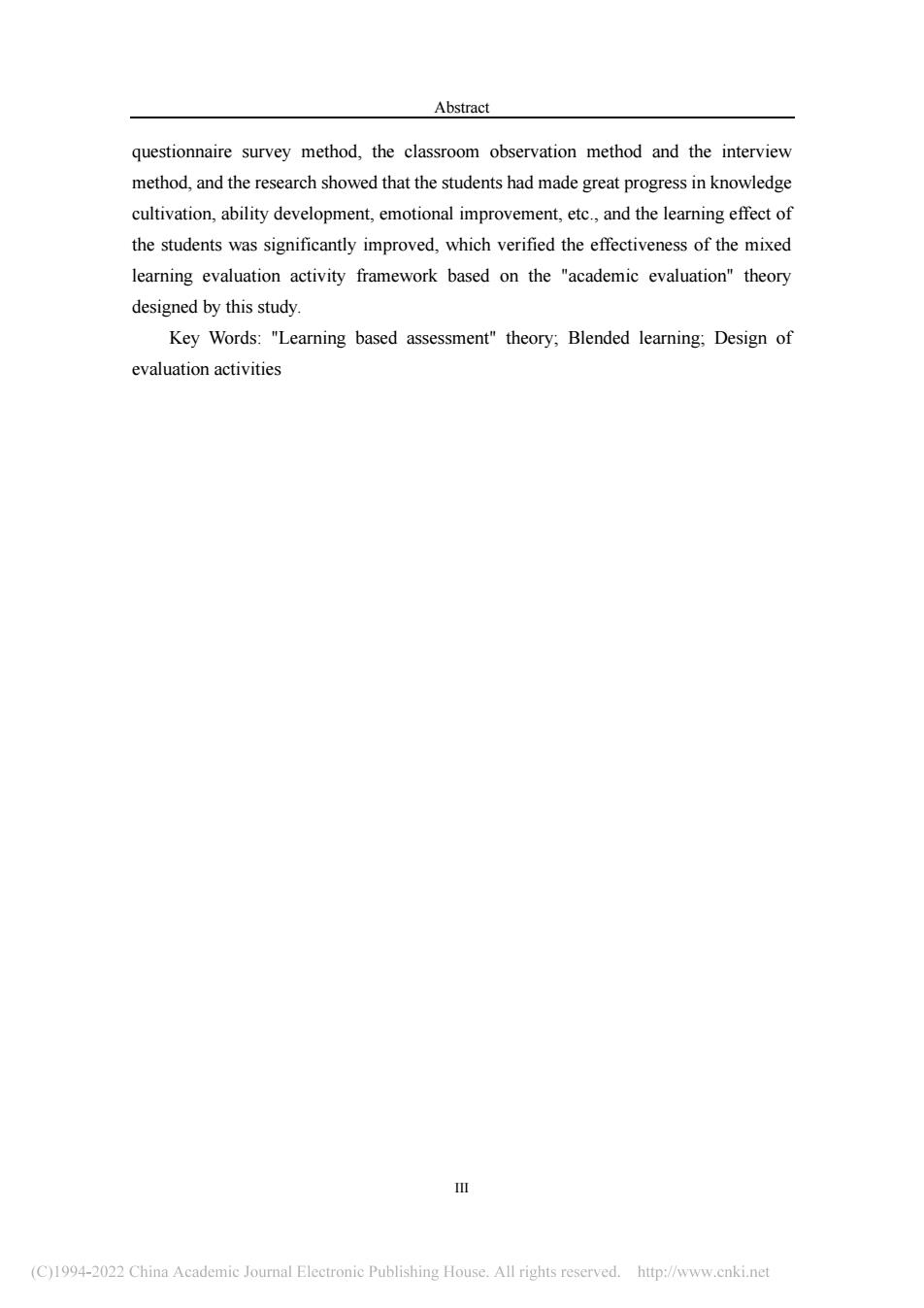
Abstract questionnaire survey method,the classroom observation method and the interview method,and the research showed that the students had made great progress in knowledge cultivation,ability development,emotional improvement,etc.,and the learning effect of the students was significantly improved,which verified the effectiveness of the mixed learning evaluation activity framework based on the "academic evaluation"theory designed by this study. Key Words:"Learning based assessment"theory;Blended learning:Design of evaluation activities (C)1994-2022 China Academie Joural Electronic Publishing House.All rights reserved.http://www.enki.net
Abstract III questionnaire survey method, the classroom observation method and the interview method, and the research showed that the students had made great progress in knowledge cultivation, ability development, emotional improvement, etc., and the learning effect of the students was significantly improved, which verified the effectiveness of the mixed learning evaluation activity framework based on the "academic evaluation" theory designed by this study. Key Words: "Learning based assessment" theory; Blended learning; Design of evaluation activities
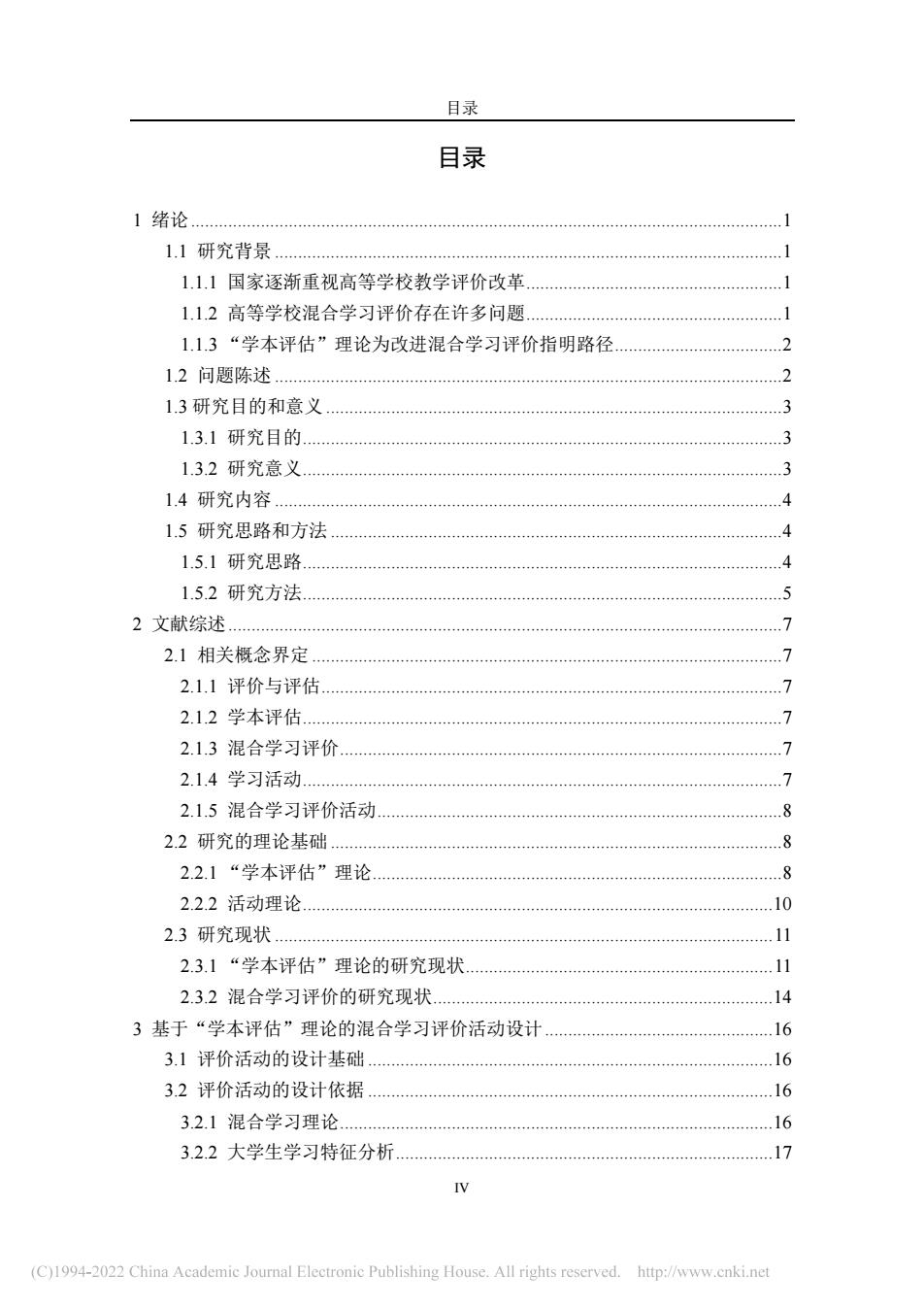
目录 目录 1绪论 1.1研究背景 1.1.1国家逐渐重视高等学校教学评价改革 1.1.2高等学校混合学习评价存在许多问题 1.1.3“学本评估”理论为改进混合学习评价指明路径. .2 12问题陈述. 1.3研究目的和意义 13.1研究目的 1.3.2研究意义 3 1.4研究内容 1.5研究思路和方法 1.5.1研究思路 1.5.2研究方法 2文献综述. 2.1相关概念界定」 .7 2.1.1评价与评估. 7 2.1.2学本评估 2.1.3混合学习评价 2.1.4学习活动 7 2.1.5混合学习评价活动 8 2.2研究的理论基础. 8 2.2.1“学本评估”理论 8 2.2.2活动理论 .10 2.3研究现状 .11 23.1“学本评估”理论的研究现状 .11 2.3.2混合学习评价的研究现状 3基于“学本评估”理论的混合学习评价活动设 .16 3.1评价活动的设计基础 .16 3.2评价活动的设计依据 .16 32.1混合学习理论. .16 32.2大学生学习特征分析 .1 C)1994-2022 China Academic Journal Elee tro nic Publishing House.All rights reserved. http://www.cnki.ne
目录 IV 目录 1 绪论.1 1.1 研究背景 .1 1.1.1 国家逐渐重视高等学校教学评价改革.1 1.1.2 高等学校混合学习评价存在许多问题.1 1.1.3 “学本评估”理论为改进混合学习评价指明路径.2 1.2 问题陈述 .2 1.3 研究目的和意义 .3 1.3.1 研究目的.3 1.3.2 研究意义.3 1.4 研究内容 .4 1.5 研究思路和方法 .4 1.5.1 研究思路.4 1.5.2 研究方法.5 2 文献综述.7 2.1 相关概念界定 .7 2.1.1 评价与评估.7 2.1.2 学本评估.7 2.1.3 混合学习评价.7 2.1.4 学习活动.7 2.1.5 混合学习评价活动.8 2.2 研究的理论基础 .8 2.2.1 “学本评估”理论.8 2.2.2 活动理论.10 2.3 研究现状 .11 2.3.1 “学本评估”理论的研究现状.11 2.3.2 混合学习评价的研究现状.14 3 基于“学本评估”理论的混合学习评价活动设计.16 3.1 评价活动的设计基础 .16 3.2 评价活动的设计依据 .16 3.2.1 混合学习理论.16 3.2.2 大学生学习特征分析.17
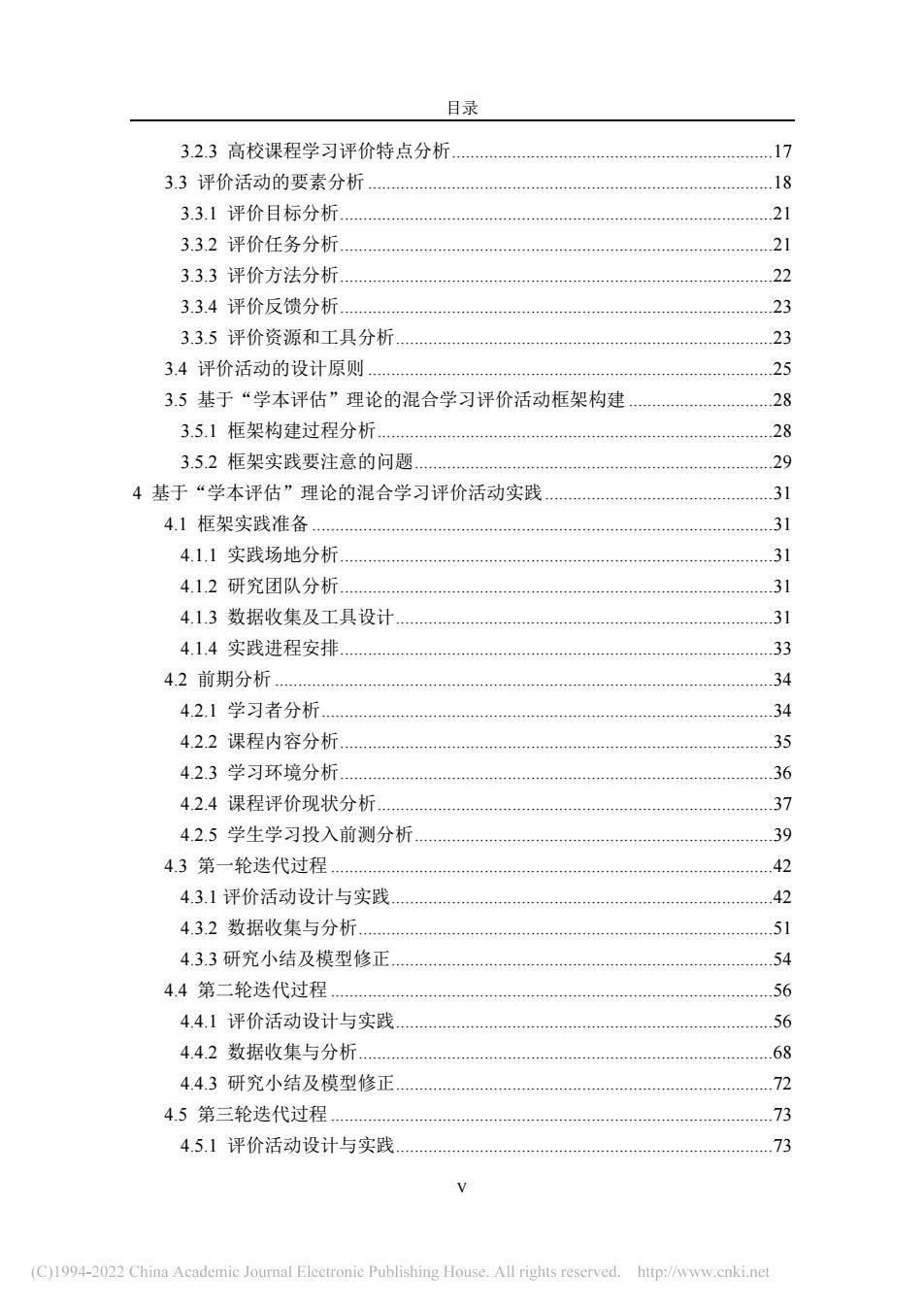
目录 3.2.3高校课程学习评价特点分析 17 3.3评价活动的要素分析 18 3.3.1评价目标分析. 21 3.3.2评价任务分析 21 3.3.3评价方法分析 22 3.3.4评价反馈分析. 23 3.3.5评价资源和工具分析 23 3.4评价活动的设计原则 25 3.5基于“学本评估”理论的混合学习评价活动框架构建 28 3.5.1框架构建过程分析 .28 3.5.2框架实践要注意的问题, 29 4基于“学本评估”理论的混合学习评价活动实践 31 4.1框架实践准备」 31 4.1.1实践场地分析 31 4.1.2研究团队分析 3 4.1.3数据收集及工具设计 31 4.14实践进程安排 33 4.2前期分析 42.1学习者分析. 34 42.2课程内容分析. 35 423学习环境分析 36 42.4课程评价现状分析 37 4.2.5学生学习投入前测分析. 39 4.3第一轮迭代过程 .42 4.3.1评价活动设计与实践 4.3.2数据收集与分析. 51 4.3.3研究小结及模型修正 .54 4.4第二轮迭代过程 .56 4.4,1评价活动设计与实践 56 4.4.2数据收集与分析 68 4.4.3研究小结及模型修正 .72 4.5第三轮迭代过程 .73 4.5.1评价活动设计与实践. .73 (C)1994-2022 China Academie Joumal Eleetronic Publishing House.All rights reserved.http://www.enki.net
目录 V 3.2.3 高校课程学习评价特点分析.17 3.3 评价活动的要素分析 .18 3.3.1 评价目标分析.21 3.3.2 评价任务分析.21 3.3.3 评价方法分析.22 3.3.4 评价反馈分析.23 3.3.5 评价资源和工具分析.23 3.4 评价活动的设计原则 .25 3.5 基于“学本评估”理论的混合学习评价活动框架构建 .28 3.5.1 框架构建过程分析.28 3.5.2 框架实践要注意的问题.29 4 基于“学本评估”理论的混合学习评价活动实践.31 4.1 框架实践准备 .31 4.1.1 实践场地分析.31 4.1.2 研究团队分析.31 4.1.3 数据收集及工具设计.31 4.1.4 实践进程安排.33 4.2 前期分析 .34 4.2.1 学习者分析.34 4.2.2 课程内容分析.35 4.2.3 学习环境分析.36 4.2.4 课程评价现状分析.37 4.2.5 学生学习投入前测分析.39 4.3 第一轮迭代过程 .42 4.3.1 评价活动设计与实践.42 4.3.2 数据收集与分析.51 4.3.3 研究小结及模型修正.54 4.4 第二轮迭代过程 .56 4.4.1 评价活动设计与实践.56 4.4.2 数据收集与分析.68 4.4.3 研究小结及模型修正.72 4.5 第三轮迭代过程 .73 4.5.1 评价活动设计与实践.73
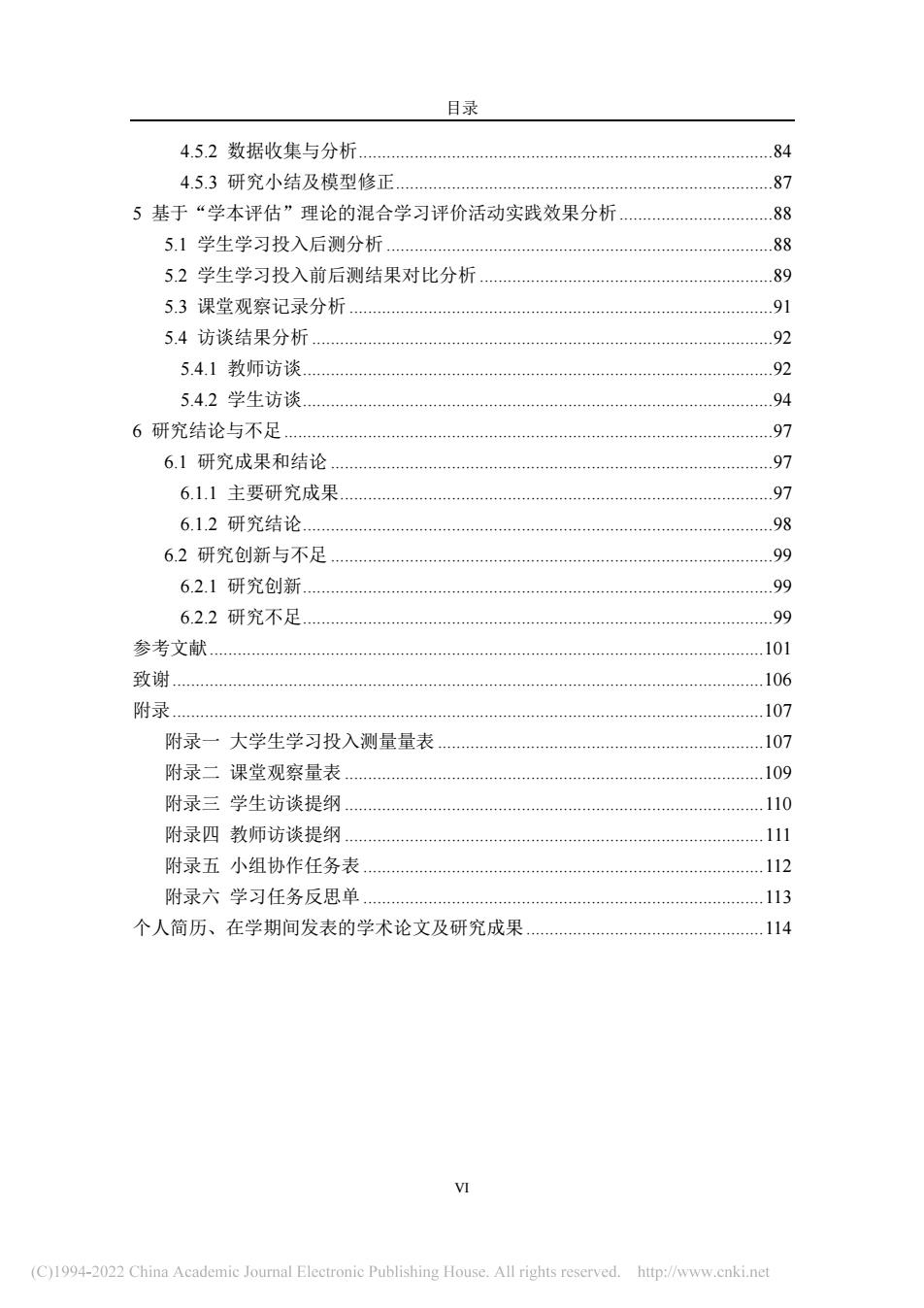
目录 4.5.2数据收集与分析. 84 4.5.3研究小结及模型修正. 87 5基于“学本评估”理论的混合学习评价活动实践效果分析 .88 5.1学生学习投入后测分析 .88 5.2学生学习投入前后测结果对比分析 .89 5.3课堂观察记录分析 91 5.4访谈结果分析, 92 5.4.1教师访谈 .92 5.4.2学生访谈 94 6研究结论与不足. 9> 6.1研究成果和结论 97 6.1.1主要研究成果 97 6.1.2研究结论. 98 6.2研究创新与不足」 99 6.2.1研究创新 99 62.2研究不足 参考文献 .101 致谢 .106 附录. .107 附录一大学生学习投入测量量表。 107 附录二课堂观察量表 .109 附录三学生访谈提纲 110 附录四教师访谈提纲 111 附录五小组协作任务表 .112 附录六学习任务反思单 113 个人简历、在学期间发表的学术论文及研究成果 114 C)1994-2022 China Academie Joumal Electronie Publishing House.All rights reserved.http://www.enki.net
目录 VI 4.5.2 数据收集与分析.84 4.5.3 研究小结及模型修正.87 5 基于“学本评估”理论的混合学习评价活动实践效果分析.88 5.1 学生学习投入后测分析 .88 5.2 学生学习投入前后测结果对比分析 .89 5.3 课堂观察记录分析 .91 5.4 访谈结果分析 .92 5.4.1 教师访谈.92 5.4.2 学生访谈.94 6 研究结论与不足.97 6.1 研究成果和结论 .97 6.1.1 主要研究成果.97 6.1.2 研究结论.98 6.2 研究创新与不足 .99 6.2.1 研究创新.99 6.2.2 研究不足.99 参考文献.101 致谢.106 附录.107 附录一 大学生学习投入测量量表 .107 附录二 课堂观察量表 .109 附录三 学生访谈提纲 .110 附录四 教师访谈提纲 .111 附录五 小组协作任务表 .112 附录六 学习任务反思单 .113 个人简历、在学期间发表的学术论文及研究成果.114